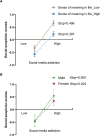The effect of social suspicion on social media addiction among Chinese college students: A moderated mediation model
- PMID: 40397848
- PMCID: PMC12094756
- DOI: 10.1371/journal.pone.0323474
The effect of social suspicion on social media addiction among Chinese college students: A moderated mediation model
Abstract
Objective: This study investigates the impact of social suspicion on social media addiction among Chinese college students, examining the mediating role of the sense of meaning in life and the moderating effect of gender.
Methods: A cross-sectional survey was conducted from September 19, 2023, to November 2, 2023, involving 1,558 students from three universities in southern Anhui Province, China. Participants completed questionnaires assessing social suspicion, social media addiction, and the sense of meaning in life. Data were analyzed using correlation analysis, Hayes' PROCESS macro, and bootstrap methods to test mediation and moderation effects.
Results: The findings revealed a bidirectional relationship between social suspicion and social media addiction. Social suspicion positively predicted social media addiction, with the sense of meaning in life mediating this relationship. Gender moderated the mediating effect, as the indirect effect of social suspicion on social media addiction through the sense of meaning in life was significantly stronger among female students compared to male students. Additionally, social media addiction also positively predicted social suspicion, with the sense of meaning in life and gender moderating this relationship.
Conclusion: This study reveals a bidirectional relationship between social suspicion and social media addiction among Chinese college students, mediated by a sense of meaning in life and moderated by gender. Social suspicion directly drives addiction while indirectly exacerbating it through reduced the sense of meaning in life, with females showing stronger mediation effects and males exhibiting heightened susceptibility to suspicion when addicted. These findings emphasize the need for gender-tailored interventions to address psychological vulnerabilities and mitigate risks of digital overuse.
Copyright: © 2025 Wei et al. This is an open access article distributed under the terms of the Creative Commons Attribution License, which permits unrestricted use, distribution, and reproduction in any medium, provided the original author and source are credited.
Conflict of interest statement
The authors have declared that no competing interests exist.
Figures



Similar articles
-
The COVID-19 related stress and social network addiction among Chinese college students: A moderated mediation model.PLoS One. 2023 Aug 25;18(8):e0290577. doi: 10.1371/journal.pone.0290577. eCollection 2023. PLoS One. 2023. PMID: 37624773 Free PMC article.
-
Socioeconomic status and internet addiction: double-mediated moderation.BMC Public Health. 2025 Jan 6;25(1):48. doi: 10.1186/s12889-024-21153-w. BMC Public Health. 2025. PMID: 39762803 Free PMC article.
-
The experiences in close relationship and internet addiction among college Students: A moderated mediation model of anxiety and information cocoon.Soc Sci Med. 2025 Feb;366:117641. doi: 10.1016/j.socscimed.2024.117641. Epub 2024 Dec 19. Soc Sci Med. 2025. PMID: 39718279
-
The impact of academic anxiety on smartphone addiction among college students: the mediating role of self-regulatory fatigue and the moderating role of mindfulness.BMC Psychol. 2025 Apr 9;13(1):354. doi: 10.1186/s40359-025-02696-y. BMC Psychol. 2025. PMID: 40205575 Free PMC article.
-
Smartphone addiction and sleep quality in the physical activity-anxiety link: a mediation-moderation model.Front Public Health. 2025 Apr 3;13:1512812. doi: 10.3389/fpubh.2025.1512812. eCollection 2025. Front Public Health. 2025. PMID: 40247873 Free PMC article.
References
-
- Schou Andreassen C, Billieux J, Griffiths MD, Kuss DJ, Demetrovics Z, Mazzoni E, et al.. The relationship between addictive use of social media and video games and symptoms of psychiatric disorders: A large-scale cross-sectional study. Psychol Addict Behav. 2016;30(2):252–62. doi: 10.1037/adb0000160 - DOI - PubMed
MeSH terms
LinkOut - more resources
Full Text Sources

